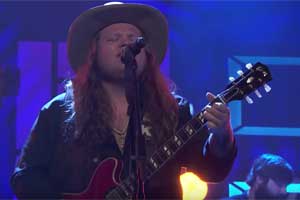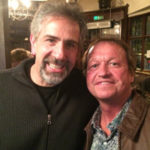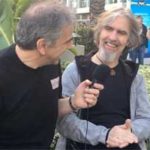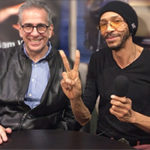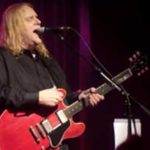This King is young, playing hot and getting well-deserved attention
By Gary Graff
December 8, 2016
Listening to the Marcus King Band’s diverse self-titled second album, King sounds like an accomplished veteran who’s spent years on the road and in intensive study of his playing, singing and writing crafts. He’s got the chops of a lifer, in other words. Not bad for a dude who’s only 20 years old. Nevertheless, King’s a third-generation working musician from Greenville, S.C. who’s been playing since he was a toddler, and when he lays into a song with his fingers or his voice it’s a potent combination of DNA and the tried-and-true tandem of inspiration and perspiration.
On The Marcus King Band, produced by Warren Haynes and featuring guest appearances by him and Derek Trucks, King and his troupe work through everything from roadhouse blues to Southern-fried soul, rock and Americana, showing off experience and confidence gained by heavy touring in support of its debut. The songwriting is on another level, too, and the buzz surrounding the album’s release indicates just how smoothly King and company are working their way into the deserved spotlight.
FGPO: Can you feel the excitement surrounding the band and this new album?
King: Y’know, sometimes it’s hard to realize that there’s any kind of buzz when you’re just working really hard and staying in focus — which is a good thing, I guess, in hindsight ’cause it keeps us focused, keeps us concentrating on what we love to do and what we need to do, if you know what I mean.
FGPO: How was making the new album different from (2014’s) Soul Insight?
King: The first one was fully produced by myself and my drummer, Jack Ryan, and I guess going from that one to the second one we learned a lot more about song structure and we learned about having more patience in the studio. The first one went so smoothly I guess we didn’t really notice that we rushed through it a little bit. With this one, Warren’s a really big believer in taking your time on an idea and not giving up right away, which is something I differ on. So he taught us a lot about patience and the structure of a song and bringing it together. That was a really big part of what he brought to the table among other things he brought — which was everything.
FGPO: How about as a guitar player? What were you able to do on The Marcus King Band that you maybe couldn’t the first time around?
King: I guess just two more years of experience, two more years of really heavy playing a lot differently than the years of playing I’d done leading up to our first record. Before Soul Insight, I was practicing, just playing six-, seven-, eight-hours-a-day, ’cause I didn’t have anything else to do. I just played my guitar all day, just learning to let the guitar become an extension of my body. The last two years have been what I know a lot of bands go through, when you don’t have a lot of crowds and you don’t have anybody to really try to put on shows for, but you still love to play. You find yourself trying to impress the musicians you’re with, trying to outplay yourself from the night before. It’s like a competition against yourself to make yourself go further just for your own self-confidence, really, and to make yourself a better player.
FGPO: You were almost pre-destined to play music, weren’t you?
King: I don’t know that there was a conscious decision, ever, where I was: ‘Alright, this is what I’m doing.’ It was just something I knew I was going to do. I just felt like it’s what I was supposed to do, even though all the career guidance tests I took and shit like that told me to disregard the notion I was going to play music. But I just had this drive and tenacity about it, and I wasn’t gonna take no for an answer.
FGPO: It also helped that you came from a musical family.
King: Sure. I really had the support of my family, because my father and my grandfather, as you know, we’re both tour musicians and they all told me how hard it was, but they gave me nothing but support in it. They told me what to do, and they told me what NOT to do, which is really important.
FGPO: What did they tell you not to do?
King: Well, my grandad always told me there’s three things that’ll ruin a musician’s career — the wrong woman, the wrong drugs and alcohol. And I’m still here… [laughs.]
FGPO: Who were your inspirations and influences?
King: I never really wanted to emulate anybody. I definitely grew up on my dad’s sound and trying to master what it was he was doing as a player. He’d leave me with his collection of CDs, and then I got into vinyl later after that. Early on I was listening to a lot of Lynyrd Skynyrd, as well as Duane Allman and obviously Hendrix and Stevie Ray Vaughan, and then you go back to Albert King, and B.B. and Freddie. All that was really inspiring me. One of the first records I remember buying was Robin Trower, Bridge Of Sighs. That was a record that really did a lot; I was a 13-year-old with the black light and some really schwag weed, and it was like a little religious experience, I could see my life ahead of me kind of thing.
FGPO: Did you jam a lot with your father and grandfather?
King: I did, yeah. One of my first recollections was kind of foreshadowing what my rig was going to be like when I got older. At the time I was playing a Squier Strat or something through my dad’s ‘ 65 Supra, which is mine now. I asked my grandad how it sounded, ’cause he always played a [Gibson] 345 through is ’64 Supra, and he said: “Well, if my amp sounded like that I’d probably take it to get fixed.” We were playing [the Marshall Tucker Band’s] “Can’t You See” and he said Toy Caldwell was rolling over in his grave. [laughs] I said: “Alright, I’ll turn this off,” and then I did take it in to get fixed.
FGPO: How did you become a Gibson guy?
King: That was kind of like a tradition in the family, I think. My grandad played a 345, and my dad played an SG; I think he flirted with a Strat most of his life, too, and I still say that’s the only Strat I’ll ever really love. But my dad gave me his Les Paul for Christmas one year, and that’s when playing [Gibsons] really started for me ’cause I had been playing a Korean Epiphone Explorer up ’til then. Then, at the age of 11, I was playing in the parking lot of a Christian bookstore with my dad’s band and I went in and they had this Gibson SG hanging up there, and it really spoke to me from behind the counter. I said: “I need to see that guitar,” so they let me see it, plugged it into the owner’s amp and that guitar and I, we just had a chemistry. It felt like me and that guitar knew each other or something.
FGPO: You went to a performing arts high school as a teenager, too, right?
King: I did, yeah. That was probably the only thing that kept me alive or kept me going in my sophomore or junior year. I went there for two years, the Fine Arts Center in Greenville, and it was a beautiful place where you could go to the second half of your school day and study all the things you wanted to and catch a head start on what you aimed to do as far as a career. You’ve got dancers and vocalists and creative arts majors, percussion majors, all these amazing kids working right beside you, and amazing instructors as well. Everybody liked their teachers, and then the principal came out it wasn’t like: “Oh shit, here he comes;” it was: “Here he is!” He was as cool as the breeze. Everybody was so happy to be there, all the time. It was really a privilege.
FGPO: You are, of course, incredibly young to be working at this level. Do you feel like a 20-year-old or is there an old blues guy inside you?
King: I think the only time I really feel like a 20-year-old is when I try to have a drink and I’ve got big X’s on my hands. [laughs] I’ve always felt that age and time is really relative to what you’re doing. I don’t think that blues has an age limit on it. Somebody asked me what gave me the right to write sad songs at such a young age; I had to tell them that you can be hurt at a young age, too. There’s no age limit on that kind of pain. And there’s no age limit on playing this kind of music, I don’t think.
FGPO: So what do you see as the road ahead?
King: I want the band to keep growing with its sound. I’m so happy with the guys that I’m working with, and I know that I’ve found my band. I think that’s all I was really waiting for was to find the right group of guys, and we just want to see it pick up from here. We don’t really seek any grandeur or glory from it; We just want to be able to tour comfortably to where we’re not sleeping in a van or piled on top of each other in two hotel rooms, all eight of us, and having to rush to get everywhere. We just want to be able to tour comfortable and be able to have time to really create new stuff and help people feel the same thing we’re feeling. And next year it will be nice to have a drink and not get ridiculed. [laughs.]
